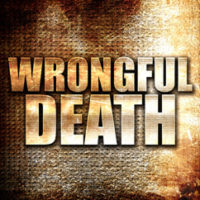The Difference Between Wrongful Death and Murder Under Florida Law

Capital murder. Homicide. Voluntary manslaughter. Involuntary manslaughter. In the United States, there are varying “degrees of murder,” and how an offender is sentenced all depends on the severity and intent of the crime. How and why the courts charge individuals with murder is increasingly confusing to the general public—after all, murder is murder is murder, right? According to our justice system, that is almost never the case. In fact, in the United States, sometimes the accidental killing of another human being will not even fall under murder or be charged as a criminal offense; however, it may be considered “wrongful death,” and be tried as a civil suit.
Civil Suit Vs. Criminal Charges
In the U.S., there are two categories of lawsuits: civil and criminal. In a civil lawsuit, an individual citizen can bring a lawsuit against another individual, company, or entity. When a person files a civil suit, they generally hire their own civil litigation lawyer who will fight on their behalf to achieve justice in the form of monetary compensation—not incarceration. Criminal lawsuits, on the other hand, are brought against a criminal offender by government prosecutors. The objective of a criminal lawsuit is to punish a criminal offender for a crime committed against one or more victims by sentencing them to jail time and/or large fines.
Key Differences Between Wrongful Death and Murder
A wrongful death would be considered a civil offense, and as such, tried in civil court. A wrongful death lawsuit is brought by the aggrieved family members of an individual who was wrongfully killed due to the negligent actions of another person. If the defendant is found guilty in a wrongful death lawsuit, they will not be punished through incarceration unless criminal intent was revealed during trial. Instead, they will be forced to pay the victim’s family for their loss.
Murder, on the other hand, is a criminal offense, and as such, is tried in criminal court. Typically, a government agency or government prosecutor will bring the charges against the offender, whether or not the victim and/or his or her family members want to press charges. If the defendant is found guilty of murder, they will be punished according to Florida Statute 782.04.
Furthermore, the burden of proof is also very different in civil and criminal cases. In a wrongful death lawsuit, the plaintiff must prove that the defendant is responsible for the death of the victim by a “preponderance of the evidence,” which means that the defendant more likely than not committed the actions in the civil complaint. In a criminal lawsuit on the other hand, the prosecutor must prove “beyond a reasonable doubt” that the defendant committed the crime.
Finally, the defendant in a wrongful death lawsuit may have just been negligent in their actions, while a murderer acted with a degree of criminal intent.
Consult an Orlando Wrongful Death Lawyer
If you recently lost a loved one due to negligence, contact the Orlando wrongful death lawyers at The Baez Law Firm to learn more about your legal options. While monetary compensation will never bring back a loved one, you can seek justice on their behalf by ensuring that the negligent party is properly reproached. To consult with a wrongful death lawyer, call 800-588-BAEZ now.
Resource:
leg.state.fl.us/Statutes/index.cfm?App_mode=Display_Statute&URL=0700-0799/0782/Sections/0782.04.html




















